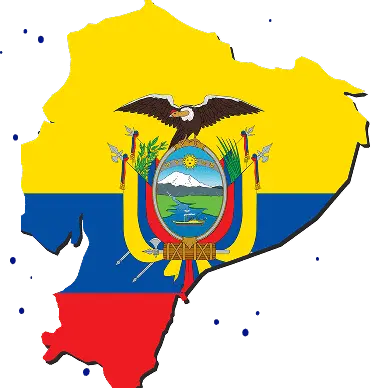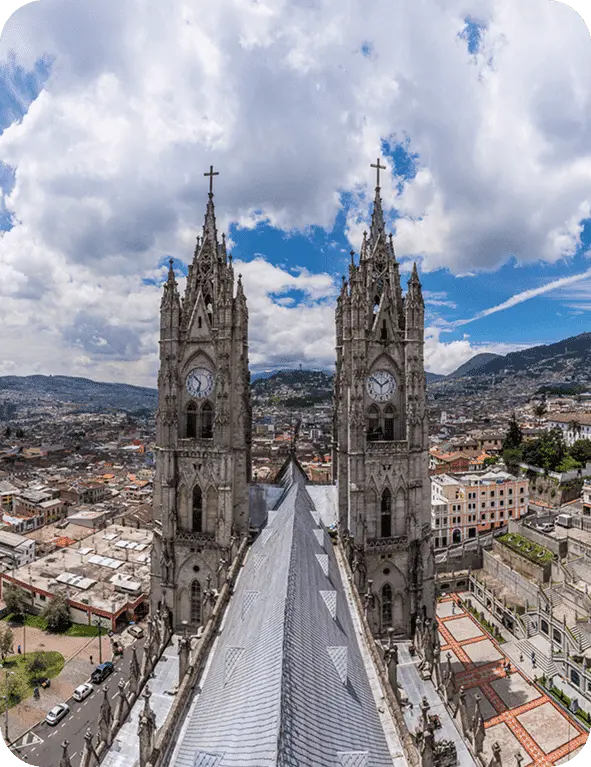Population
GDP (per capital)
Visa-Free Countries
GDP (purchasing power parity)
-
How to Immigrate to Ecuador Without Investing
- Ecuador has rapidly emerged as a favored destination for expatriates, thanks to its dollar-based economy, affordable cost of living, and extraordinary biodiversity ranging from the Andes to the Galápagos Islands. Cities like Cuenca and Quito host vibrant expat communities that offer both cultural richness and a welcoming atmosphere. Beyond lifestyle advantages, mid-2025 has brought notable updates to the country’s visa framework, including revised Pensioner, Investor, Rentista (digital nomad), and Professional categories, reflecting new income thresholds tied to the minimum wage. These changes make it essential for prospective residents to stay informed about the latest residency and immigration policies before making the move.
- Main Industries
- Agriculture and Agribusiness
- Oil and Gas Extraction
- Fishing and Aquaculture
- Mining and Mineral Production
- Food and Beverage Processing
- Tourism and Ecotourism

(UTC-5)
283,561 km2
USD
Quito
Spanish (official)
indigenous languages (e.g., Quechua, Shuar)
Overview of Visa Process & Path to Permanent Residency
Overview of Visa Process & Path to Permanent Residency
Short-Term Entry
- Many nationalities, including EU and U.S. citizens, can enter Ecuador visa-free for up to 90 days.
- Tourist permits are widely used for initial short-term visits and exploration.
Temporary Residency
- All temporary residency visas are generally valid for two years.
- These visas include categories such as Pensioner, Investor, Rentista (digital nomad), and Professional visas.
- Temporary residents seeking permanent residency must:
- Reside in Ecuador for at least 21 months.
- Avoid being outside the country for more than 90 days per year.
Permanent Residency & Naturalization
- After meeting the residency requirement, individuals can apply for permanent residency.
- Eligibility for naturalization arises after three years of permanent residency.
- Requirements for naturalization include:
- Spanish language proficiency.
- Cultural integration into Ecuadorian society.
- Ecuador allows dual citizenship, so applicants can retain their original nationality.
Main Visa Categories (2025 Requirements)
Main Visa Categories (2025 Requirements)
Ecuador provides a range of visa options tailored to retirees, remote workers, investors, and professionals, each designed with specific income or investment requirements and offering clear pathways to temporary and permanent residency.
Pensioner (Jubilado) Visa
The Pensioner Visa is designed for retirees who receive a guaranteed monthly pension or Social Security. It is ideal for those who want a simple, investment-free route to residency, though it is limited to individuals relying on passive income.
- Income requirement: US $1,410/month (three times Ecuador’s 2025 minimum wage of $470) plus $250/month per dependent
- Pros: Simple application, no investment needed, leads to permanent residency
- Cons: Limited to passive income; cannot work locally
Rentista / Digital Nomad Visa
This visa caters to remote workers, freelancers, and those with rental or other foreign-sourced income. It allows holders to work for international clients while residing in Ecuador and provides a pathway for family members to join through an Amparo (dependent) visa.
- Income requirement: US $1,410/month from foreign sources; $250/month per dependent
- Processing fees: $50 application fee, $400 issuance fee, mandatory health insurance ~US $45/year
- Features: Allows remote work for foreign clients; family can join via Amparo visa
- Alternate name: “Rentista” or “Digital Nomad Visa”
Investor Visa
The Investor Visa is intended for individuals who contribute to Ecuador’s economy via real estate, deposits, trusts, or corporate shares. It offers lower income requirements than other visas and allows active engagement in business and property.
- Investment minimum: 100× minimum salary (~US $47,000), though many advisors recommend US $100,000 for real estate clarity
- Monthly income requirement: US $470
- Pros: Ability to work, lease property, and transition to permanent residency after two years
Professional Visa
Designed for individuals with university degrees earned in-person, the Professional Visa allows immediate professional engagement in Ecuador. Degrees must be apostilled and registered with SENESCYT, which can take a few months.
- Income requirement: US $470/month (plus $250 per dependent in some cases)
- Benefits: Permits salaried, freelance, or business work from day one
- Processing: SENESCYT registration typically takes ~3 months
Amparo (Dependent) Visa
The Amparo Visa allows immediate family members—spouses, children, or parents—to reside in Ecuador alongside the principal visa holder. Eligibility depends on proof of relationship and adequate financial support from the main applicant.
- Requirements: Proof of relationship; sufficient income from primary applicant, plus $250/month per dependent
- Purpose: Enables families to live together in Ecuador under the principal visa holder’s sponsorship
-
Recent Policy Change: Visa Requirement for Chinese Nationals
- Since July 1, 2024, Ecuador has reinstated visa requirements for Chinese nationals, reversing the previous visa-exempt arrangement. This policy shift is a response to increased irregular migration trends, reflecting Ecuador’s efforts to better manage entry and residency procedures while maintaining border security. As a result, Chinese citizens who wish to visit, work, or settle in Ecuador must now obtain the appropriate visa prior to arrival, making this update particularly relevant for both short-term travelers and long-term residents.
- Effective date: July 1, 2024
- Reason: Measures to address irregular migration trends and ensure proper immigration control
- Impact: Chinese nationals are required to secure a visa in advance; this affects tourism, business travel, and applications for temporary or permanent residency
Documentation & Fees
Documentation & Fees
Obtaining any visa in Ecuador requires careful preparation of specific documents to ensure a smooth application process. While requirements vary slightly depending on the visa category, all applicants must provide a set of core documents demonstrating identity, legal standing, and financial or professional qualifications.
Key Documentation
- Valid passport: Minimum six months’ validity with blank pages.
- Criminal background certificate: Apostilled certificate from the applicant’s country of origin and any country of residence over the past five years.
- Health insurance: Proof of coverage valid in Ecuador.
- Financial proof: Bank statements or contracts demonstrating sufficient income or investment.
- Professional credentials: For the Professional Visa, university diplomas must be apostilled and registered with SENESCYT.
Fees
- Application fee: US $50
- Visa issuance fee: US $270–400, depending on the visa category
- Cedula ID (national identity card): US $15
Careful attention to documentation and fees is crucial, as missing or incorrect paperwork can delay processing. Keeping updated with the latest 2025 requirements ensures compliance and a smoother pathway to temporary or permanent residency in Ecuador.

Timeline & Tips
- Planning ahead is essential for a smooth transition to Ecuador. Experts recommend starting the visa preparation process approximately six months before your intended move, allowing sufficient time to collect apostilled documents, secure certified translations, and validate professional credentials where required.
- Many applicants make use of the 90-day tourist permit to remain in Ecuador while completing their residency application. Extensions can be requested close to the end of this period for a fee of roughly US $153, providing additional flexibility for completing paperwork.
- To minimize delays and avoid potential mistakes, it is highly advisable to engage a bilingual local immigration lawyer. Professional guidance can streamline the application process, ensure compliance with the latest 2025 regulations, and provide peace of mind throughout each step of obtaining temporary or permanent residency.
Post-Residency: Permanent Residency & Citizenship
- After holding a temporary residency visa for 21 months and adhering to Ecuador’s rules regarding absences—specifically, not spending more than 90 days outside the country per year—applicants become eligible to apply for permanent residency. This status provides long-term stability, allowing individuals to live, work, and invest in Ecuador with far fewer restrictions than during the temporary visa period. Permanent residency also serves as a critical stepping stone toward full citizenship.
- Following three years of permanent residency, individuals may pursue naturalization. This process requires applicants to demonstrate proficiency in Spanish, as well as a degree of cultural integration into Ecuadorian society, ensuring familiarity with local customs, laws, and social norms. Successfully obtaining citizenship grants the full rights of an Ecuadorian national, while Ecuador’s policy of dual nationality allows residents to retain their original citizenship. This combination of permanent residency and eventual naturalization offers a clear, structured pathway for expatriates seeking long-term commitment and belonging in Ecuador.

Conclusion
Ecuador has emerged as a compelling destination for expatriates, offering a stable economy, affordable cost of living, and unparalleled natural and cultural diversity. With clear pathways through temporary and permanent residency visas, retirees, remote workers, investors, and professionals can establish themselves securely while enjoying the country’s vibrant communities. Recent updates, including the reinstated visa requirement for Chinese nationals and revised income and investment thresholds, highlight the importance of staying informed about evolving policies. Careful planning, thorough documentation, and professional guidance can streamline the process, enabling a smooth transition from short-term stays to permanent residency and, ultimately, citizenship. By understanding and navigating Ecuador’s visa framework thoughtfully, expatriates can fully embrace the opportunities and lifestyle the country has to offer.
FAQ about How to Immigrate to Ecuador Without Investing
How long can I stay in Ecuador on a tourist permit?
Most nationals, including EU and U.S. citizens, can stay in Ecuador visa-free for up to 90 days. Extensions are possible near the end of this period for a fee of around US $153, allowing additional time to complete residency applications.
What are the main visa options for long-term residence?
Ecuador offers several temporary residency visas:
- Pensioner (Jubilado) Visa – for retirees with guaranteed income
- Rentista / Digital Nomad Visa – for remote workers or rental income recipients
- Investor Visa – for those investing in real estate, deposits, or shares
- Professional Visa – for university degree holders registered with SENESCYT
- Amparo (Dependent) Visa – for family members joining a principal visa holder
How can temporary residency lead to permanent residency and citizenship?
After 21 months on a temporary visa (with no more than 90 days outside Ecuador per year), you may apply for permanent residency. Following three years of permanent residency, naturalization is possible, requiring Spanish proficiency and cultural integration. Ecuador allows dual citizenship, so your original nationality can be retained.
What documents and fees are required for visa applications?
All visas generally require: a valid passport (≥6 months), apostilled criminal background certificates, health insurance, bank statements or contracts, and for professionals, SENESCYT-registered diplomas.
- Application fee: US $50
- Issuance fee: US $270–400 depending on visa type
- Cedula ID: US $15
Looking for expert visa support?
PROGRAM MATCH
Compare the different programs in a nutshell and discover their features
PROGRAM COST
Check the cost estimates for each offered program
PROGRAM MAP
Explore the power of global mobility for every passport in the world
